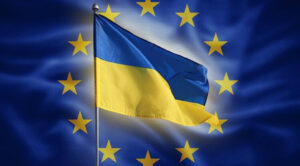
The European Council, which brings together EU heads of state, at a meeting on March 21-22, supported in principle the extension of the liberalization of the trade regime with Ukraine for another year, which provides preferential conditions for Ukrainian exports to the EU, but the final decision is still being agreed upon, said Deputy Prime Minister for European and Euro-Atlantic Integration Olga Stefanishyna.
“The European Council voted in favor of the decision on trade liberalization,” she said at an exporters’ summit organized by Forbes Ukraine on Friday, adding that only a number of technical issues remain.
“The decision on trade liberalization was discussed during the European Council meeting. EU leaders supported the importance of continuing autonomous trade preferences. The approval process is ongoing,” Stefanyshyna said in a comment to Interfax-Ukraine.
The Deputy Prime Minister noted that the conclusion of the European Council meeting states that it calls for continuing work without delay to resolve issues related to autonomous trade preferences for Ukraine “in a fair and balanced manner.”
“At the same time, the need to find a long-term solution within the framework of the EU-Ukraine Association Agreement and the free trade area is enshrined,” Stefanyshyna also said.
Earlier it was reported that the European Council and the European Parliament had previously agreed to extend the suspension of import duties and quotas on Ukrainian exports to the EU for another year, until June 5, 2025, by strengthening protective measures for sensitive agricultural products. The new safeguard measures, in particular, oblige the European Commission to automatically reintroduce tariff quotas if imports of eggs, sugar, oats, corn, cereals, and honey exceed the arithmetic average of imports in 2022-2023.
At the same time, large European agricultural associations and farmers’ unions claim that the proposed measures are insufficient to protect the EU market from imports of Ukrainian agricultural products and demand that restrictions be strengthened. They insist, in particular, that when calculating import limits from Ukraine, data for the pre-war year 2021, when such imports were minimal, should be taken into account instead of the two war years proposed by the European Commission – 2022-2023. In addition, farmers’ associations propose to include wheat in the list of sensitive agricultural products whose exports will be limited by a safeguard mechanism.

Ambassadors of European Union member states supported the extension of trade liberalization with Ukraine, the Swedish EU presidency said on its Twitter page.
“The Committee of Permanent Representatives (Coreper) has just supported the renewal of the Provisional Trade Liberalization Regulation supplementing trade concessions under the EU-Ukraine Association Agreement. This will support Ukraine’s economy after Russia’s full-scale invasion of Ukraine,” the statement said.
The decision must then be approved by the European Parliament, followed by a formal decision by the European Council. The procedure should be completed at the end of May.
A day earlier, on Thursday, the “green light” to extend the cancellation of import duties on Ukrainian exports to the European Union for a period of one year to support the country’s economy was given by the European Parliament’s Committee on International Trade. The vote in the plenary session is scheduled for May 8-11.
As it was reported, the problematic issue was the ban on the import of Ukrainian agricultural products by five EU countries – Poland, Bulgaria, Hungary, Romania and Slovakia. It was caused by the accumulation in these countries of Ukrainian agricultural products intended for further import. In this connection, on April 19, President of the European Commission Ursula von der Leyen announced proposals to introduce a temporary – until June 5 – import ban on corn, wheat, rapeseed, sunflower and sunflower oil for these five countries. Besides, financial compensation in the amount of EUR100 million is envisaged for these countries.

The Ukrainian delegation during the WTO ministerial conference held about two dozen bilateral talks on possible trade liberalization and removal of existing barriers, in particular, in trade in agricultural products, Deputy Economy Minister – Trade Representative of Ukraine Taras Kachka said.
“The main conclusion is that the world believes in Ukraine and is ready to open markets for Ukrainian products. This means that the world believes in our victory over the aggressor,” he wrote on Facebook after the conference.
Kachka also said that Ukraine has sent a request to the European Free Trade Association (Switzerland, Norway, Iceland, Liechtenstein) to update the free trade agreement, and it will be considered next week within the framework of the EFTA institute.
According to the trade representative, he discussed further steps to liberalize trade, having carried out preparatory work right at the conference, with Canadian Minister of International Trade Mary Ng.
Kachka added that he agreed with the Minister of Trade of Australia in a few days after the conference to discuss in detail the possibilities of liberalizing bilateral trade (GSP and FTA).
The Ukrainian trade representative also said that he had discussed the conclusion of an agreement on digital trade with UK Secretary for International Trade Anne-Marie Trevelyan.
“The same issue – trade liberalization and digital trade – were relevant in a conversation with the Minister of Trade of Singapore. Singapore is ready to become a hub for trade in Ukrainian products in Asia,” Kachka added.
According to him, at a meeting with the Minister of Trade of Senegal, he emphasized that Ukraine is doing everything to increase exports and feed Africa.
“Senegal is chairing the African Union this year and their understanding of the true causes of food problems is very important,” the Ukrainian trade representative said.
AUSTRALIA, CANADA, ICELAND, LIECHTENSTEIN, NORWAY, SWITZERLAND, TRADE LIBERALIZATION